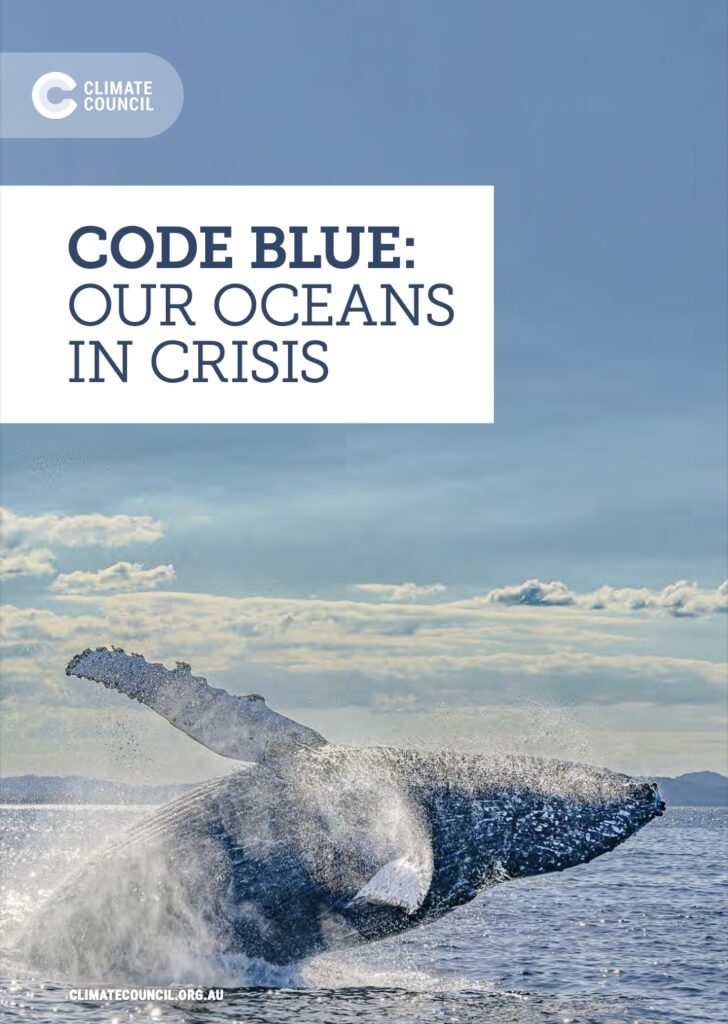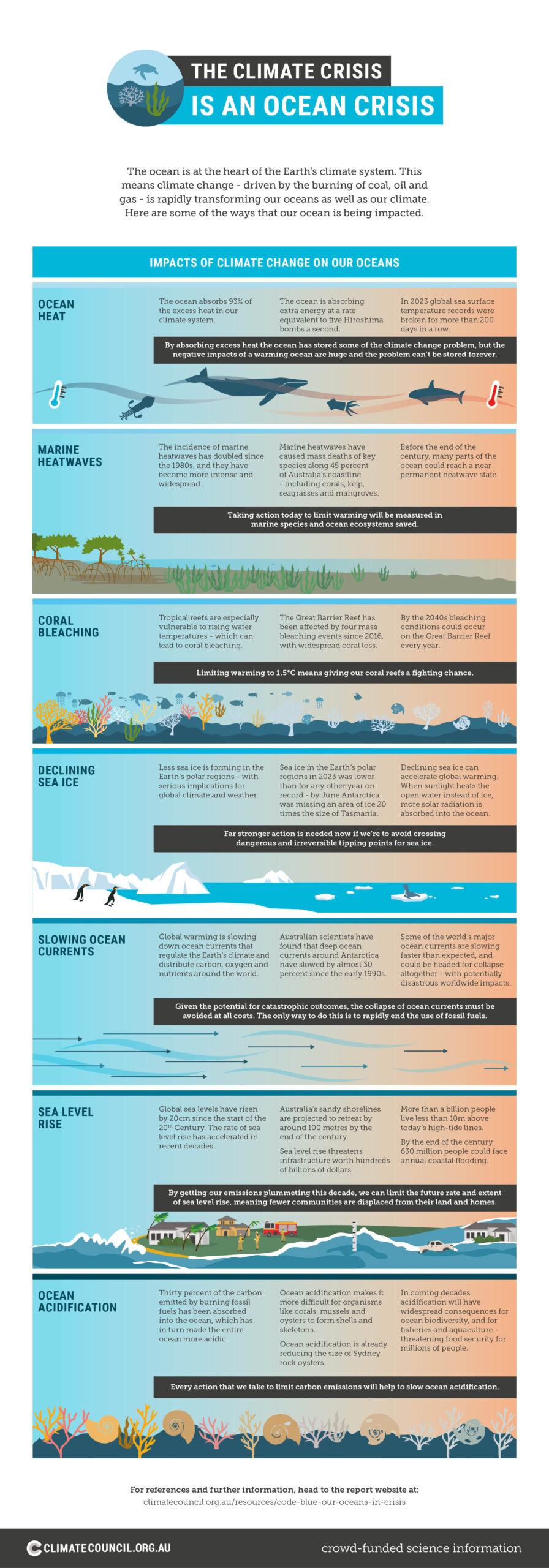In Australia, our love of the ocean is truly profound, we surf it, camp by it, we marvel at its incredible beauty from its many pristine sandy shores and we are proud of the unique and wondrous sea life that inhabits it. But all of this is at grave risk.
Our oceans are in trouble. As our climate changes, driven by the unchecked burning of fossil fuels, our seas are transforming before our eyes. Marine heatwaves are surging, coral reefs are on the brink, ice sheets are melting at an alarming rate, currents are slowing and seas are rising. Put simply: the climate crisis is an ocean crisis.
The ocean is the beating heart of planet Earth, and the lifeblood for all humanity. It produces over half the oxygen we breathe. Its currents regulate our climate and weather. The marine life within it provides sustenance for billions. Our cultures, economies and very identity are tied to the sea.
We have pushed this wondrous, life-giving system to the brink by burning coal, oil and gas. More than 90 percent of the heat trapped by greenhouse gas emissions has been absorbed by the ocean. Parts of the ocean could reach a near-permanent heatwave state within decades. Our iconic Great Barrier Reef may soon face annual mass coral bleaching. Entire island nations like Tuvalu and Kiribati could become uninhabitable this century as seas rise.
The ocean is a vital carbon sink, absorbing more than 30 percent of the carbon dioxide that humans emit by burning fossil fuels and clearing land. This has changed the chemical make-up of the entire ocean, making it more acidic. By absorbing excess heat, and carbon, the ocean has shielded us from the worst of climate change so far. But we are now seeing the consequences of its sacrifice. The climate crisis is no longer a far-off threat. The ocean is screaming a warning that cannot be ignored.
We must heed the call and act with urgency. We must show a commitment to protecting our precious ocean and all the life that depends on it, starting with the urgent phase out of coal, oil and gas this decade, restoring damaged ecosystems, expanding marine sanctuaries and supporting Indigenous stewardship. The solutions are clear. What is needed is for governments to understand and act with the urgency that is required to meet this mighty challenge.
Key findings
1. The health of the planet’s oceans, and human survival, are intrinsically linked.
- The ocean and the atmosphere form a coupled system that shapes the Earth’s climate. This global dance between the ocean and the atmosphere underpins life as we know it.
- All life on Earth depends on the water cycle that starts in the ocean. Humans also need the ocean in other fundamental ways. More than half the oxygen we breathe comes from the ocean.
- Climate change – driven by the burning of coal, oil and gas – is rapidly transforming our oceans. In a very real sense, the climate crisis is an oceans crisis.
- A warmer ocean can drive serious impacts thousands of kilometres away on land, like fuelling the conditions that sparked Australia’s Black Summer, or generating monstrous cyclones that decimate coasts and cities.
- The ocean connects all communities around the planet. It is a key part of our life support system. For many it is also core to our identity and culture.
2. The world’s oceans are absorbing mind-boggling amounts of excess heat generated by human-induced global warming.
- The ocean has absorbed 93 percent of the excess heat trapped by greenhouse gas emissions.
- The rate of ocean warming has more than doubled since the mid 1990s.
- Today the ocean is absorbing excess heat energy equivalent to five Hiroshima bomb explosions every second, or enough to boil Sydney Harbour every eight minutes.
- By absorbing so much heat, the ocean has lulled us into a false sense of security, masking the true extent of human interference in the climate system. It is now beginning to buckle, with serious consequences.
- The oceans are also absorbing more than 30 percent of the extra carbon dioxide emitted from human activities, slowing its build-up in the atmosphere. However, as emissions rise, the ocean will become less effective as a carbon sink.
3. Abrupt and concerning changes to the ocean are now starting to outpace scientific predictions. Experts are deeply worried.
- In a survey of 30 ocean and climate scientists around the world, more than half said ocean changes are occurring faster than models projected.
- Two-thirds (60 percent) said ocean surface temperature changes are happening faster than expected and half (53 percent) said loss of Antarctic sea ice is happening faster than expected.
- Every scientist surveyed expressed extreme or very high levels of concern about the impact climate change is having on the world’s oceans.
4. Marine heatwaves are becoming more severe and frequent, with devastating consequences for iconic coral reefs, kelp forests and other marine species.
- The incidence of marine heatwaves has doubled since the 1980s.
- Marine heatwaves have already caused mass deaths of key species along 45 percent of Australia’s coastline. Australia’s giant kelp forests have declined by more than 90% due to ocean warming.
- Parts of the ocean could reach a near permanent heatwave state by the end of this century, unless urgent action is taken to reduce fossil fuel emissions.
- The Great Barrier Reef has suffered mass bleaching four times since 2016 and faces a very difficult period ahead as an El Niño, against the backdrop of ocean warming, drives extreme heat conditions.
5. Coastal communities across Australia and the Pacific are all threatened by warming oceans and ocean acidification, from robbing us of our big ocean playground, to decimating entire communities.
- Global sea levels have risen 20cm since the start of the 20th century, with the rate of rise accelerating.
- Australia’s sandy shorelines are projected to retreat by 110m by the end of the century.
- Low-lying Pacific atoll nations face threats to habitability and food security from sea level rise.
- The rate of sea level rise will continue to accelerate. Through stronger action to reduce emissions this decade, we can still limit the rate and extent of sea level rise over the long term, saving many communities and species from forced displacement.
- As the oceans absorb more carbon dioxide, they become more acidic. This makes it more difficult for organisms like corals, mussels and oysters to form shells or skeletons. Ocean acidification is already reducing the size of Sydney rock oysters.
- Sea level rise and changing wind and swell patterns threaten to undermine treasured surf spots around the country, disrupting one of Australia’s most iconic pastimes.
6. Urgent action is needed to protect our oceans and limit warming, starting with rapidly phasing out coal, oil and gas.
- Rapidly phasing out fossil fuels is critical to limit further ocean warming and acidification.
- To play our part in limiting warming to 1.5°C, and avoiding catastrophic tipping points for our ocean, Australia must aim to reduce emissions by 75 percent below 2005 levels by 2030, and reach net zero by 2035.
- Reform of Australia’s flawed environmental laws – to fully account for the climate impacts of new projects – is urgently required to put an end to new fossil fuel developments. Climate change impacts must be considered when approving any development (currently, they are not).
- Our oceans also harbour many climate solutions. Mangroves and coastal wetlands absorb carbon at a rate two to four times greater than mature tropical forests and protect coastlines from erosion.
- Expanding marine protected areas and restoring blue carbon ecosystems will be vital to give our oceans and all the life that inhabits them a fighting chance.
- More support is urgently needed for communities adapting to ocean changes. First Nations stewardship and leadership must be supported and resourced.

